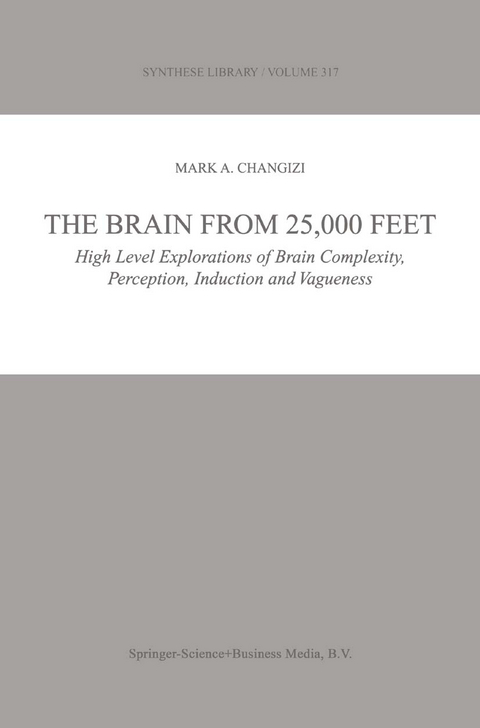
The Brain from 25,000 Feet
High Level Explorations of Brain Complexity, Perception, Induction and Vagueness
Seiten
2003
Springer-Verlag New York Inc.
978-1-4020-1176-4 (ISBN)
Springer-Verlag New York Inc.
978-1-4020-1176-4 (ISBN)
In The Brain from 25,000 Feet, Mark A. The author tackles such questions as why the brain is folded, and why animals have as many limbs as they do, explaining how these relate to principles of network optimality.
In The Brain from 25,000 Feet, Mark A. Changizi defends a non-reductionist philosophy and applies it to a variety of problems in the brain sciences. Some of the key questions answered are as follows. Why do we see visual illusions, and why are illusions inevitable for any finite-speed vision machine? Why aren't brains universal learning machines, and what does the riddle of induction and its solution have to do with human learning and innateness? The author tackles such questions as why the brain is folded, and why animals have as many limbs as they do, explaining how these relate to principles of network optimality. He describes how most natural language words are vague and then goes on to explain the connection to the ultimate computational limits on machines. There is also a fascinating discussion of how animals accommodate greater behavioral complexity. This book is a must-read for researchers interested in taking a high-level, non-mechanistic approach to answering age-old fundamental questions in the brain sciences.
In The Brain from 25,000 Feet, Mark A. Changizi defends a non-reductionist philosophy and applies it to a variety of problems in the brain sciences. Some of the key questions answered are as follows. Why do we see visual illusions, and why are illusions inevitable for any finite-speed vision machine? Why aren't brains universal learning machines, and what does the riddle of induction and its solution have to do with human learning and innateness? The author tackles such questions as why the brain is folded, and why animals have as many limbs as they do, explaining how these relate to principles of network optimality. He describes how most natural language words are vague and then goes on to explain the connection to the ultimate computational limits on machines. There is also a fascinating discussion of how animals accommodate greater behavioral complexity. This book is a must-read for researchers interested in taking a high-level, non-mechanistic approach to answering age-old fundamental questions in the brain sciences.
Preface.- 1: Scaling in Nervous Networks. 1.1. The mammalian neocortex.- 1.2. Complexity in brain and behavior.- 1.3. The shape of limbed animals.- 2: Inevitability of Illusions.- 2.1. Visual inferences.- 2.2. A simple latency correction model.- 2.3. Explaining the geometrical illusions.- 2.4. Further directions for latency correction. 3: Induction and Innateness.- 3.1. Paradigm Theory.- 3.2. Applications.- 3.3. "Solution" to riddle and theory of innateness.- 4: Consequences of a Finite Brain.- 4.1. Vagueness, the phenomenon.- 4.2. Unseeable holes in our concepts.- 4.3. From theory to vagueness.- 4.4. Discussion.- Bibliography.- Index.
| Erscheint lt. Verlag | 31.3.2003 |
|---|---|
| Reihe/Serie | Synthese Library ; 317 |
| Zusatzinfo | XXVI, 330 p. |
| Verlagsort | New York, NY |
| Sprache | englisch |
| Maße | 155 x 235 mm |
| Themenwelt | Naturwissenschaften ► Biologie ► Evolution |
| Naturwissenschaften ► Biologie ► Humanbiologie | |
| Naturwissenschaften ► Biologie ► Zoologie | |
| ISBN-10 | 1-4020-1176-8 / 1402011768 |
| ISBN-13 | 978-1-4020-1176-4 / 9781402011764 |
| Zustand | Neuware |
| Haben Sie eine Frage zum Produkt? |
Mehr entdecken
aus dem Bereich
aus dem Bereich
Komplette Neuübersetzung. Mit einem Nachwort von Josef H. Reichholf.
Buch | Hardcover (2018)
Klett-Cotta (Verlag)
48,00 €
Wie die Vernichtung der Arten unser Überleben bedroht - Der …
Buch | Softcover (2023)
Penguin (Verlag)
15,00 €


